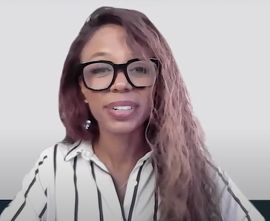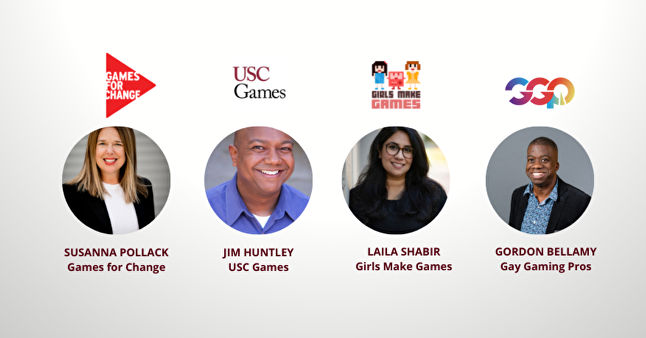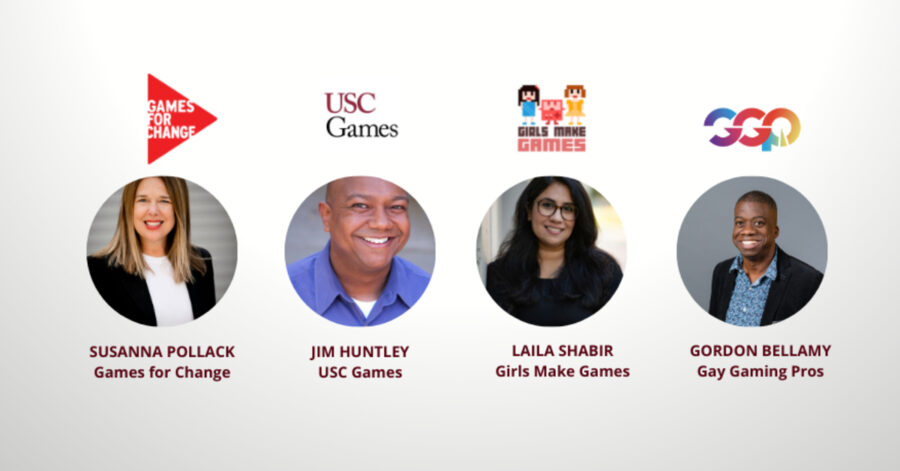For many publishers, E3 is all about the games. But Take-Two took a different tack this year, organising a panel around diversity, equity and inclusion.
Hosted by Toni Ligons, director of diversity and inclusion at 2K, the session featured the following panel:
- Jim Huntley, professor and head of marketing at the University of Southern California, executive producer for USC Games Expo, and one of the people behind the Gerald A. Lawson Endowment Fund
- Susanna Pollack, president of non-profit organisation Games For Change, which pursues real-world impact through games
- Gordon Bellamy, professor of the Practice of Cinematic Arts at USC, head of the USC Games Bridge incubator, and CEO of Gay Gaming Professionals
- Laila Shabir, founder of Girls Make Games, which organises workshops designed to inspire the next generation of women in games
“Equity and diversity has been a challenge for the gaming industry since its inception”
Jim Huntley
Kickstarting the session, Huntley emphasised the importance of diversity and equity in games, and their increasing role despite ongoing challenges.
“Equity and diversity has been a challenge for the gaming industry since its inception,” he said. “It hasn’t really changed very much over time, but I think the biggest change people are seeing in the last two to three years is the lack of it in the modern era, and the rationale that there’s no excuse behind [the industry] not having better equity and diversity from here on out. Companies are now looking to invest in getting more diversity in their ranks and getting more stories told from different points of view.”
The panel highlighted several paths for companies wishing to boost their diversity and inclusion efforts in order to create a more diverse industry.
Get involved early and make sure to present diverse role models
One key theme was to get involved with schools to show games as a viable career path to a wider range of populations as early as possible in their curriculum.
A lot of what Huntley has been focusing on at USC Games is making sure that students of colour — Black and Indigenous students in particular as they have the least representation within the industry — can get the chance they deserve via scholarships, for instance.
“But the challenge that we have — and I think the challenge society and the industry have — is it starts earlier than that,” he said. “There’s a phrase [that] I remember [hearing]: the inequities of our past paid dividends into the future. And that sticks with me because the reality is if you don’t have access to computer science labs and specialised education in grade school, high school and junior high school, the odds of you having a great portfolio piece when it comes time to apply to a programme like ours put you at a deficit. And if that deficit keeps rolling on to the future, generation after generation, the gap between the ability to get into some of these slots in game design and not being able to get them gets wider and wider.

Host Toni Ligons, director of diversity and inclusion at 2K
“So we need to do a better job as a society. How do we get students some opportunities from grade school? How do we make sure they can see this as an option? When I, as a Black man, get in front of a small group of grade school students and I say ‘I work in the video game industry’, you can see the eyes just… [mimics eyes opening wide] and their minds explode, because they’ve never seen anyone like me in the videos they see on YouTube or other visitors to their classes. So it’s important to show that we have a presence here, but it’s also important to make sure that the students who look like us who are 20, 30, 40 years behind us, also have the opportunities that we didn’t get.”
It’s a topic that speaks to the work Pollack does with Games for Change, targeting young people at schools in underserved communities. For the past six years, the organisation has been running its Games for Change Student Challenge for instance, which has reached over 30,000 young people in middle and high school.
“We not only gave them an opportunity to learn how to make games, but we also combined that with civic engagement, so they have to think about how games can help make their communities better,” Pollack explained. “Right from the start we want to empower them to think about this really important medium, not only as something they love to do but [also learn] skills that can help them regardless of what career path [they want]. But what we really hope to see happen is that they see a future for themselves and they see an opportunity.
“An important part of our programme is this idea of mentoring — mentoring from peers and also from people from the community. As Jim said, it’s so important they see themselves in the people that are coming to speak to them. So when we’re in Los Angeles, for example, we can reach out to USC Games for game design students to come and speak to the kids, we can bring people from Riot, Activision or Take-Two, to come in and say: ‘Yes, this is what I do and this is something for you’.
“It’s so important to see people who are like yourself, to walk into a room and feel like you’re not an outsider”
Laila Shabir
“Take-Two has been part of our challenge since the beginning, offering scholarships to our grand prize winners, and I can tell you that that’s a motivator for kids to participate. Not just because there’s a scholarship at the end but it’s because Take-Two is part of it. Like it made us cool. And I think it’s that relationship at that young of an age that makes a connection to people.”
This is a topic Michael Anderson also touched upon in our GamesIndustry.biz Academy article about lifting the barriers for Black professionals in the games industry, highlighting that you “can’t be what you can’t see.”
The importance of seeing people like yourselves is why it’s crucial to have dedicated spaces like Girls Make Games for underrepresented communities, Shabir added.
“We get this question a lot: why do you need a space that’s just for girls? But I think it’s just so important to create that space because it’s so important to see people who are like yourself. For many of the girls that come to [Girls Make Games summer] camps, this is their first time walking into a room full of girls who love video games. It’s very important to walk into a room and feel like you’re not an outsider. And the best way to do that is to show many more faces that look just like you.”

Help create pipelines into the industry
Shabir added that it’s crucial to create the right pipeline for young people, from the first moment they start seeing the industry as a career path, all the way to actually working in games. It’s all about creating the right pathways and games companies can help doing that by getting involved.
“Seven years out for Girls Make Games and [we’re] finally starting to see girls make plans together to go to college,” she continued. “This year I would say it’s the first time we got dozens of emails from families saying: ‘My daughter is now thinking of college, how do we get this portfolio going, how do we set that up?’ There’s so many challenges that people have to go through just to get everything right. You shouldn’t have to rely on luck so much.
“If you look at the women who are now excelling and thriving in the industry, and you ask them their stories, so many things had to go right in their lives to finally end up in the industry. Many of them ended up there accidentally, like me. But it shouldn’t have to be luck or accident. We can actually intentionally create these pipelines and I think it requires all of us working together. How do we pass our students on from [school], as young as eight, on to the [right] programmes and then onto the Student Challenge and then on to USC and then finally on to the industry — I think that’s basically the magic formula to solving the problem that we’re talking about today.”
“Alongside diversity, equity and inclusion there’s a new word that’s come [up] a lot which is belonging — [that] feeling of being default”
Gordon Bellamy
Bellamy highlighted the importance of making underrepresented communities feel like they can be the standard profile in games, that they belong in this industry.
“We have a mission which is focused on education, employment, expertise and entrepreneurship,” he explained. “And the reason why is because alongside diversity, equity and inclusion there’s a new word that’s come [up] a lot which is belonging — [that] feeling of being default. And I know that people in their uniqueness do a lot of mental socioeconomic and social gymnastics before they get to be as good as they are, before they get a chance to participate in this panel or participate in our industry by and large. And I think the work that we all share is trying to disrupt some of those mental gymnastics that young women, people of colour, Indigenous people, neurodiverse people, need to do in order to be as great as they are, to belong in the space, a cohort that treats each other as default.”
He continued: “I’ve been to every E3. I was a booth boy when I started and I’m still here, 25-26 years later. I haven’t missed one yet, so I hope that someone out there sees this and begins their path.”
Make diversity and inclusion a business goal
The panel was asked about what corporations can do to set themselves up for success when it comes to diversity and inclusion.
The primary piece of advice the speakers agreed on was to make sure diversity and inclusion is embedded in your business strategy and is treated as equally important a goal as your financial success or how many copies of your game you’re shifting.
“I think [it’s about] making the success of Black people, of women, of queer people, of Indigenous people, of neurodiverse people a business goal,” Bellamy said. “The same way that the consumption [of] content — get some downloadable skins, buy some NBA 2K — [is] a business goal. And I feel as though if the expertise of women, Black people, neurodiverse, [and] other populations, was a business goal, then that would be the change. It’d be that simple. Our business is more successful if there is more of this.”
“[It’s about] making the success of Black people, of women, of queer people, of Indigenous people, of neurodiverse people a business goal”
Gordon Bellamy
Huntley agreed, adding that looking at diversity and inclusion as a business challenge is key and can often be a game changer. From being inspired by the social justice marches last summer to establishing the Gerald A. Lawson Endowment Fund earlier this year, he and USC Games programme chair Danny Bilson looked at the situation as a business problem.
“What are your challenges? I’ve got gaps in my supply chain if you will,” he explained. “So how do I fill those gaps in my supply chain? And really working your way backwards in a way where you’re putting objectives, strategies, and tactics in place to achieve those goals from a business perspective.
“You’re going to see an outcome when it’s not just: ‘Here’s a check and good luck with charity X’. It’s gonna be more: ‘Here’s a check, this is what we’re hoping to see, let’s measure along the way and see if we’re seeing progress on that’. And it’s the measurement of progress and adjusting in real-time based on the data that you’re getting back, that’s where you’re gonna see the the gap start to close in a meaningful way, and be able to point out to other people in the industry: ‘Hey, this is what we can all do together, what if we scale this effort up and really had an impact on society as a whole?’ That mindset is really going to be what changes the game.”
Shabir, on the other hand, invited companies to look at the situation as a pie — but not in the typical way.
“We always think about: there’s a pie and everyone gets a little piece of the pie. But a pie is not a fixed size. By including more people, the pie gets bigger”
Laila Shabir
“We always think about: there’s a pie and everyone gets a little piece of the pie,” she said. “But I think the way we have to approach this really is: a pie is not a fixed size. By including more people, the pie gets bigger. By including more people in the industry, by becoming creators of this medium, you can actually expand the medium, beyond just entertainment.
“When I look at video games, it’s such an underutilised tool for social change. Coming in as an outsider to the games industry, I was just kind of blown away by that. You can do so much. Nine out of ten kids play video games — not nine out of ten boys, nine out of ten kids. We’re talking about literally changing perceptions and inspiring and educating generation after generation, and yet that power rests in the hand of a select few. I think we need to bring in pretty much everyone, anyone and everyone who’s interested in building a future together in that.”
Advice for employee resource groups
As part of the Q&A part of the event, the panel was asked for advice for employee resource groups who are looking for ways to further embed themselves into the business and make an impact.
Huntley went back to the idea that you can’t manage what you can’t measure and advised organisations to keep track of what works and what doesn’t.
“If we aggregate our dollars and really focus on some key objectives, we can really move the needle in a way that’s going to [work]”
Jim Huntley
“If you don’t have a way to see how your progress is evolving over a continuum, you’re kind of just going: ‘Well, I think something’s worked once, you keep doing that’! And business people — myself being one of them — don’t respond well to that. Let’s just keep investing in a thing that I don’t know the results of…? You need to be able to go back and [show an evolution]. [It’s] the positive feedback loop: here’s data that shows that what we’re doing is having an impact on our objectives, and rewarding partners for that investment over that support. That’s really key to building a positive feedback loop around investing in diversity, equity, inclusion.
“When you aggregate how much revenue and profit goes in the games business, for a meaningful moving of the needle of [diversity and inclusion] comparatively speaking it’s not a huge amount of money. To have a really big demonstrable impact, if we aggregate our dollars and really focus on some key objectives, we can really move the needle in a way that’s going to [work]. Frankly when you start seeing things work, people get excited. And it gets bigger and bigger and bigger.”
Talking about the journey towards visibility for the Girl Makes Group organisation in particular, Shabir explained that it happened pretty organically as there is an increasing demand from the industry for that type of initiative.
“This is a very fortunate problem to have where we’re getting pulled in a hundred directions, because we’re needed in a hundred directions, as opposed to us telling people that this is important. Really, the tide is turning. We’re building a new industry, we’re building on the industry that we have but we’re also building a new part of the industry together, so it’s really exciting.”
The social justice movement that emerged last year has also been instrumental in bringing awareness to the struggle of some underrepresented groups, and in particular Black people. And on that note specifically Bellamy had one last word of advice for resource groups.
“One more thing: just keep saying Black out loud. Let’s get back to Black is beautiful. We’ve been residing in Black Lives Matter for a long time and we need to be back to like ‘Black and proud’ and ‘Black is beautiful’, and so [is] your existence. And saying it, and saying positive outcomes after the word Black, is meaningful each and every day that you can do it in your ERG.”
GamesIndustry.biz
Source link
Related Post:
- Take-Two boss says inclusion and diversity are of 'paramount importance'
- How to get a job as a diversity and inclusion officer
- How did the pandemic impact diversity, equity, and inclusion in the industry?
- Watch EA Play Live Spotlight's Future of FPS panel here for Battlefield 2042 and Apex Legends chat
- The GamesIndustry.biz Academy Jobscast: Recruitment and diversity
- Raccoon Logic's approach to diversity and culture | DLC
- Amiqus to promote diversity and inclusivity at UK Best Places To Work Awards
- Deathloop's Julianna PvP and Invasions Explained in QuakeCon Panel
- Meet the Athletes of the 'Gaming for Inclusion' Tournament
- Xbox Partners with Special Olympics for the Inaugural Gaming for Inclusion Esports Tournament
